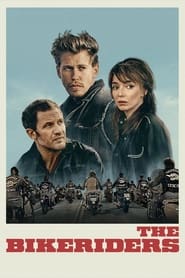Cambridge Film Festival 2023: Film #24
The Bikeriders implication that it was the Summer of Love, the hippies with their pot and "all that there college learnin'" that corrupted the pure and noble motorcycle gang is a little unsavoury. In that sense, this film reminded me a little of Tarantino's crypto-reactionary Once Upon a Time… in Hollywood (2019), but what it also reminded me of was Almost Famous (2000) — here you have a film about a male-coded subculture, a narrative device in the form of a photographer/journalist and a 'groupie' character who acts as the journalist's guide and audience proxy.
Anyway, I don't think the filmmakers were actually trying to create a piece of reactionary nostalgia. For one thing, The Bikeriders doesn't seem to have the undercurrent of malice. But, moreover, the actors were all just having too much fun scowling, dressing up in asymmetrical leather biker jackets and indulging in the most outrageous accents and recycling lines and poses out of Rebel Without a Cause and other half-remembered bits of 1950s ephemera swirling around the culture. Needless to say, this film is entirely absent of any deliberate homosexual overtones, but it is also deeply uninterested in any exploration of homosocial group dynamics. This is less a film with a narrative or a message of any kind than a passion project by filmmakers who thought it would be 'really cool' in a kind of teenage 'poster on bedroom wall' kinda sense.
As endearing as Kathy’s disapproving bemusement can be, this conversational voiceover feels mostly superfluous. Serving as an on-ramp into a milieu that’s already relatively familiar, it also adds to the overall feeling of artificiality, reducing the gang to archetypes and permitting only a superficial understanding of what motivates them. […] [Despite] efforts to analyze the tropes and themes that he’s indulging throughout, Nichols generally seems a lot less interested in digging beneath the surface of American mythology […]. The sociological context that led to the creation of biker gangs at this time in history is also barely touched upon, with a few references to Vietnam and hippie culture and a sense of contempt toward college boy “pinkos” being the only aspects tethering the story to the real world.
— David Robb (Slant)
There are moments in the film that transcend its scattered middle, particularly when David Wingo’s slick score and Julie Monroe’s explosive editing (with particularly memorable uses of freeze-frame) meet in bursts of self-awareness. And yet, The Bikeriders is ultimately a stylish vacuum, with the plot gradually collapsing in on itself as the runtime stretches on.
— Anna McKibbin (Paste Magazine)
For several years bike movies have constituted a kind of underground folk literature for adolescents, have located an audience and fabricated a myth to exactly express that audience’s every inchoate resentment, every yearning for the extreme exhilaration of death. To die violently is “righteous,” a flash. To keep on living, as Peter Fonda points out in The Wild Angels, is just to keep on paying rent. A successful bike movie is a perfect Rorschach of its audience.
— Joan Didion: Notes Toward a Dreampolitik

